In a competitive market, small businesses are stretched thin managing customer support, marketing, sales, and daily operations. This constant juggling act often leads to burnout, inefficiencies, and missed growth opportunities. The solution isn't working harder; it's working smarter through automation. By implementing the right small business automation tools, you can reclaim valuable time, reduce operational costs, and deliver a superior customer experience that scales with your business. These platforms handle repetitive tasks, from lead nurturing to appointment scheduling, freeing you and your team to focus on strategic initiatives that truly drive growth.
This guide provides an in-depth analysis of the 12 best automation platforms for 2025. We move beyond generic feature lists to give you practical, real-world insights. For each tool, you'll find a breakdown of core strengths, ideal use cases, honest limitations, and pricing considerations, complete with screenshots and direct links to help you make an informed decision. To understand how deeply automation can transform specific business functions, consider the impact of automated recruitment software on hiring processes. Our goal is to equip you with a curated list of powerful solutions that streamline workflows, connect disparate systems, and ultimately fuel your success.
My AI Front Desk solidifies its position as a premier small business automation tool by offering a powerful, all-in-one virtual receptionist solution. This platform excels at automating customer interactions across multiple channels, including phone calls, SMS, and email, ensuring no lead is ever missed. It’s designed to handle everything from initial lead qualification and appointment scheduling to answering complex, company-specific questions 24/7 with human-like conversational intelligence.
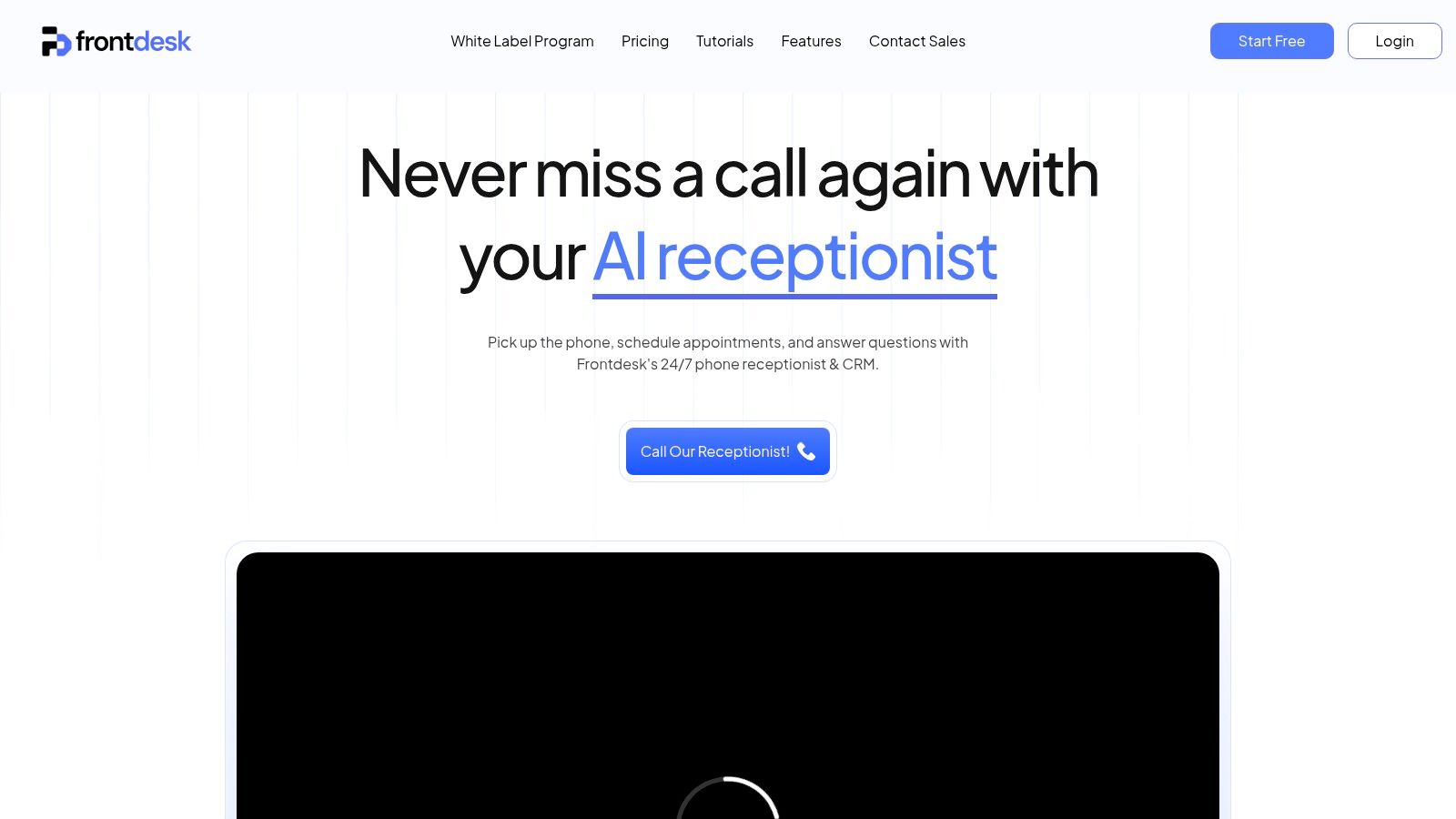
Unlike many automation tools that focus on a single function, My AI Front Desk combines an AI receptionist with an outbound dialer, voicemail transcription, and contextual texting capabilities. This unified approach allows small businesses to create sophisticated, end-to-end customer journeys without juggling multiple subscriptions. The platform's ability to handle unlimited parallel calls without latency is a significant advantage for businesses experiencing high call volumes.
Pros:
Cons:
Website: https://myaifrontdesk.com
Zapier stands as the undisputed champion of no-code integration, acting as the digital glue connecting over 7,000 different web applications. Its core strength lies in its simplicity and sheer breadth of connectivity, making it an indispensable tool for small businesses aiming to automate workflows without writing a single line of code. Users can create automated workflows, called "Zaps," using a straightforward visual builder that follows a "when this happens, do that" logic.
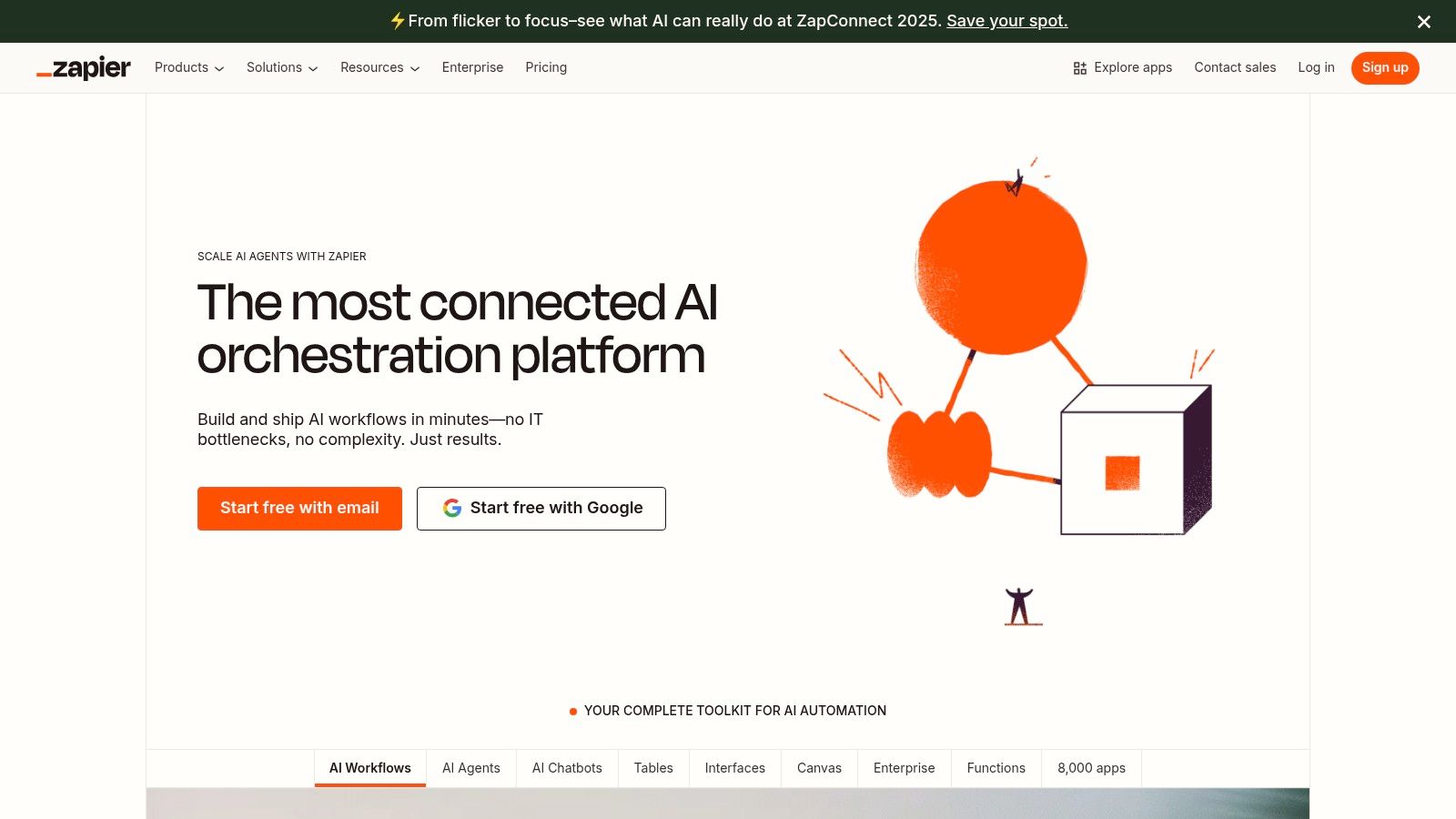
The platform's massive integration library is its main draw, covering nearly every popular SMB tool from CRMs to email marketing platforms. More advanced "Zaps" can include multiple steps and conditional logic using Paths and Filters, allowing for sophisticated process automation. For more information, you can explore other business process automation tools for 2025.
Pros:
Cons:
Website: https://zapier.com
Make, formerly known as Integromat, is a powerful visual automation platform that gives small businesses granular control over their workflows. It differentiates itself from simpler trigger-action tools by offering a dynamic drag-and-drop canvas where users can build complex, multi-step scenarios with branching logic, routers, and iterators. This visual approach makes it easier to design and debug intricate data flows, making it one of the most flexible small business automation tools available.
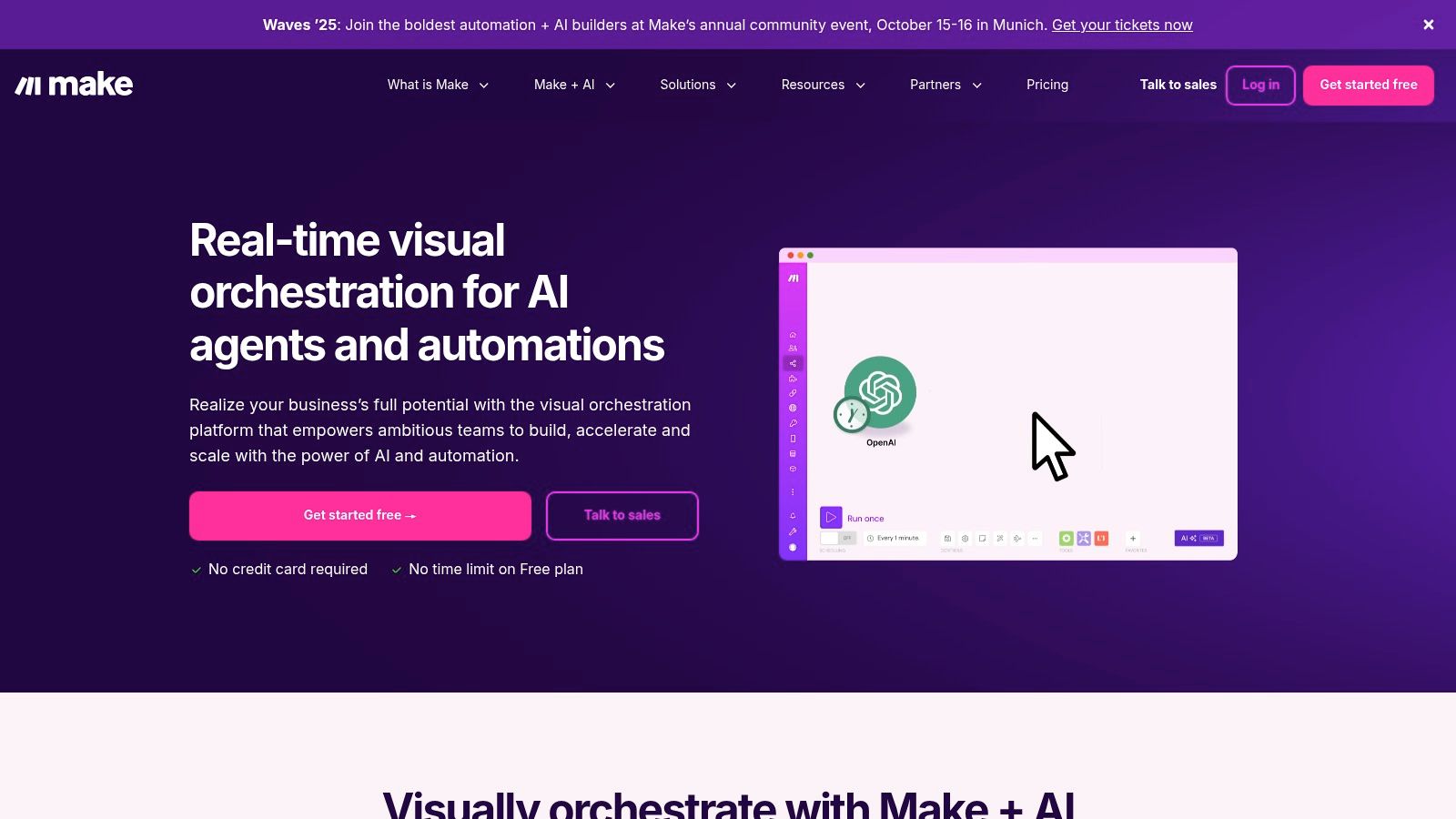
Make's core strength lies in its advanced features like robust error handling, scheduling capabilities, and the ability to process data in bundles. It integrates with over 2,000 applications and provides robust API access for building custom connections. Unlike task-based pricing, Make uses "operations," which offers a more transparent view of usage.
Pros:
Cons:
Website: https://www.make.com
Microsoft Power Automate is a robust automation platform designed for businesses deeply embedded in the Microsoft 365 ecosystem. Its primary advantage is the seamless, native integration with applications like Outlook, Teams, SharePoint, and Excel, making it one of the most powerful small business automation tools for companies standardized on Microsoft software. The platform supports both cloud-based digital process automation (Cloud Flows) and desktop-based robotic process automation (RPA), allowing users to automate everything from email approvals to complex data entry tasks.
Power Automate offers a vast library of over 1,300 connectors and pre-built templates to accelerate workflow creation. Its low-code visual designer allows users to build sophisticated automations, while more advanced features like AI Builder and Process Mining provide intelligence-driven insights to optimize business processes. The platform's pricing is structured around user licenses and capacity add-ons.
Pros:
Cons:
Website: https://www.microsoft.com/power-automate
IFTTT, which stands for "If This, Then That," is one of the most accessible small business automation tools, known for its extreme simplicity. It excels at connecting apps and smart devices for straightforward, single-action automations called "Applets." For solo operators or micro-businesses, IFTTT is perfect for handling simple tasks like cross-posting social media content, syncing calendar entries with a to-do list, or managing smart office devices without a complex setup.
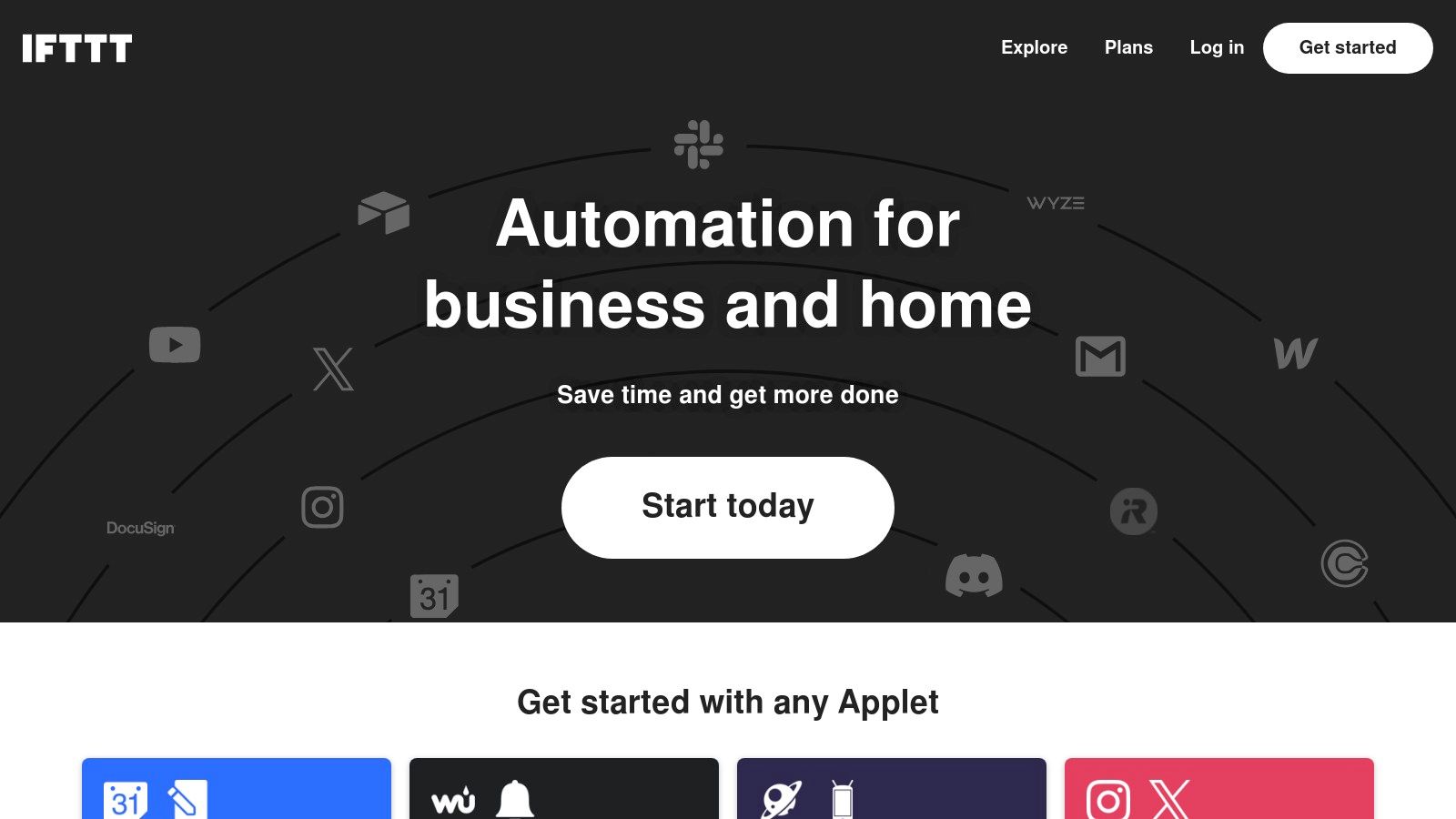
The platform's strength is its user-friendly, template-driven approach where users can enable pre-built Applets in seconds. While the free plan is limited, paid tiers unlock more powerful features like multi-action Applets, faster execution speeds, and the ability to use Webhooks for more custom integrations. The Pro+ plan also allows connecting multiple accounts from the same service, such as managing several Twitter profiles.
Pros:
Cons:
Website: https://ifttt.com
HubSpot offers an all-in-one CRM platform where its Marketing Hub shines as a powerful automation engine. Instead of stitching together disparate tools, HubSpot provides a unified solution for automating email campaigns, lead nurturing sequences, and customer segmentation directly within its ecosystem. This integrated approach makes it one of the most cohesive small business automation tools for businesses wanting to align their marketing, sales, and service efforts under one roof.
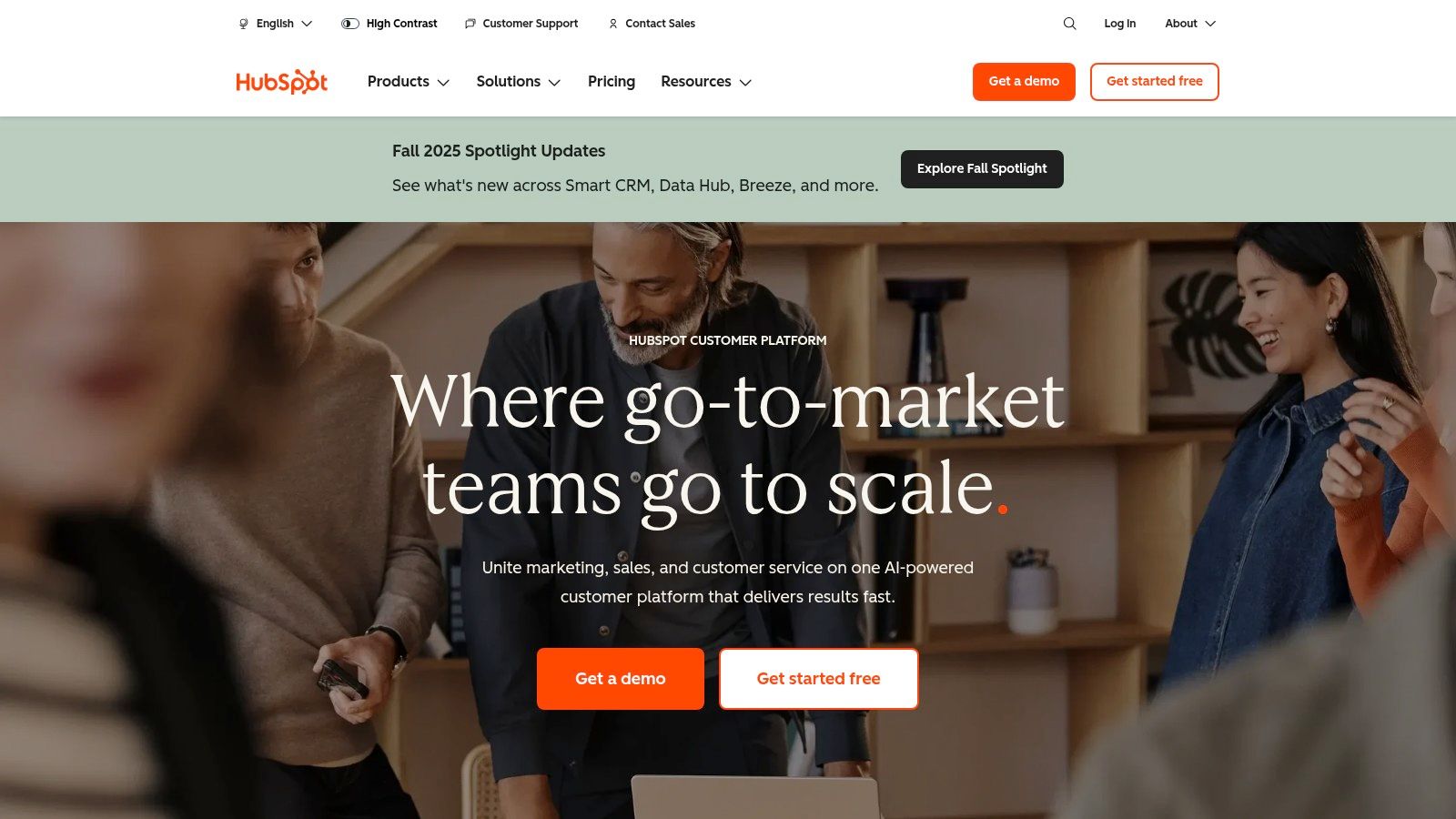
The platform's strength lies in its ability to trigger complex workflows based on user behavior, contact properties, and list memberships. Features like lead scoring, internal notifications, and A/B testing are built-in, providing deep analytical insights into campaign performance. To get the most out of the platform, you can learn how to sync HubSpot with other business tools in real-time.
Pros:
Cons:
Website: https://www.hubspot.com
Mailchimp is a powerhouse in email and marketing automation, renowned for making sophisticated lifecycle marketing accessible to small businesses. It goes beyond simple email blasts, offering tools to build automated customer journeys based on user behavior, such as welcome series, abandoned cart reminders, and re-engagement campaigns. Its approachable interface and robust template library allow businesses to create professional-looking campaigns quickly.
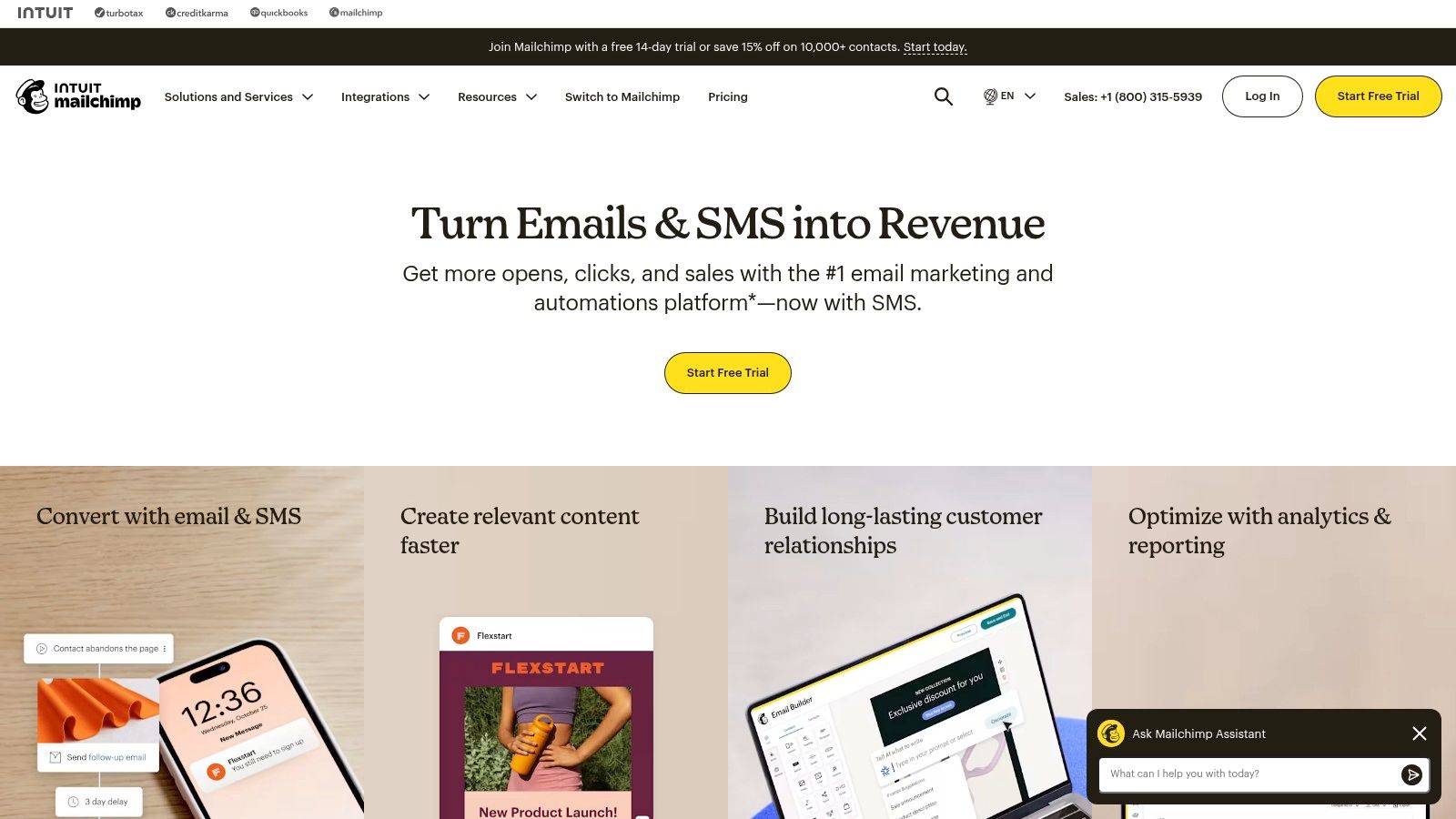
The platform's strength lies in its all-in-one marketing capabilities, from audience segmentation to AI-assisted content creation. Higher-tier plans unlock powerful features like A/B and multivariate testing, which are crucial for optimizing campaign performance. While it is known for email, Mailchimp's capabilities are expanding, similar to how many modern platforms are integrating AI. You can explore a variety of other AI-powered tools for small business automation.
Pros:
Cons:
Website: https://mailchimp.com
Airtable transcends the traditional spreadsheet by blending the familiarity of a grid interface with the power of a relational database. This spreadsheet-database hybrid is uniquely suited for small businesses looking to centralize their operations, from managing content calendars and client intake forms to building simple CRMs. Its strength lies in structuring data in a flexible way and then building powerful, native automations directly on top of that data, creating a single source of truth.
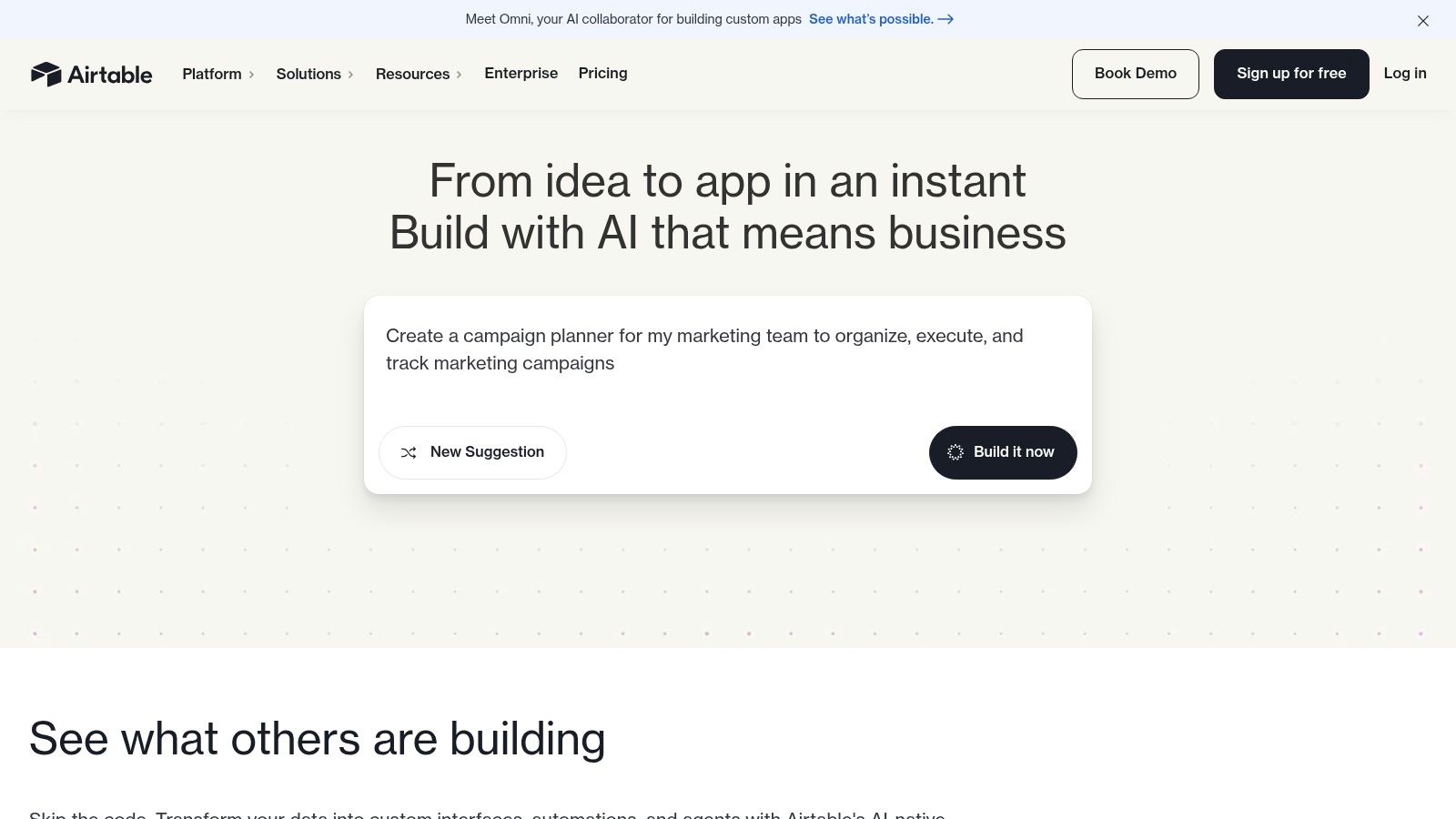
Airtable's core features include customizable views (Grid, Kanban, Calendar), custom forms for data entry, and a new "Interfaces" feature for creating interactive dashboards. Native automation allows users to trigger actions based on record changes, such as sending emails or updating other records without needing a third-party tool. This makes it one of the most versatile small business automation tools available.
Pros:
Cons:
Website: https://airtable.com
n8n is a powerful and extensible workflow automation platform that offers a unique proposition for small businesses: choice and control. Unlike many cloud-only competitors, n8n provides a self-hostable Community Edition, giving tech-savvy teams full command over their data and infrastructure. This "source-available" model, combined with a sophisticated node-based visual editor, makes it one of the most flexible small business automation tools for creating complex, custom workflows.
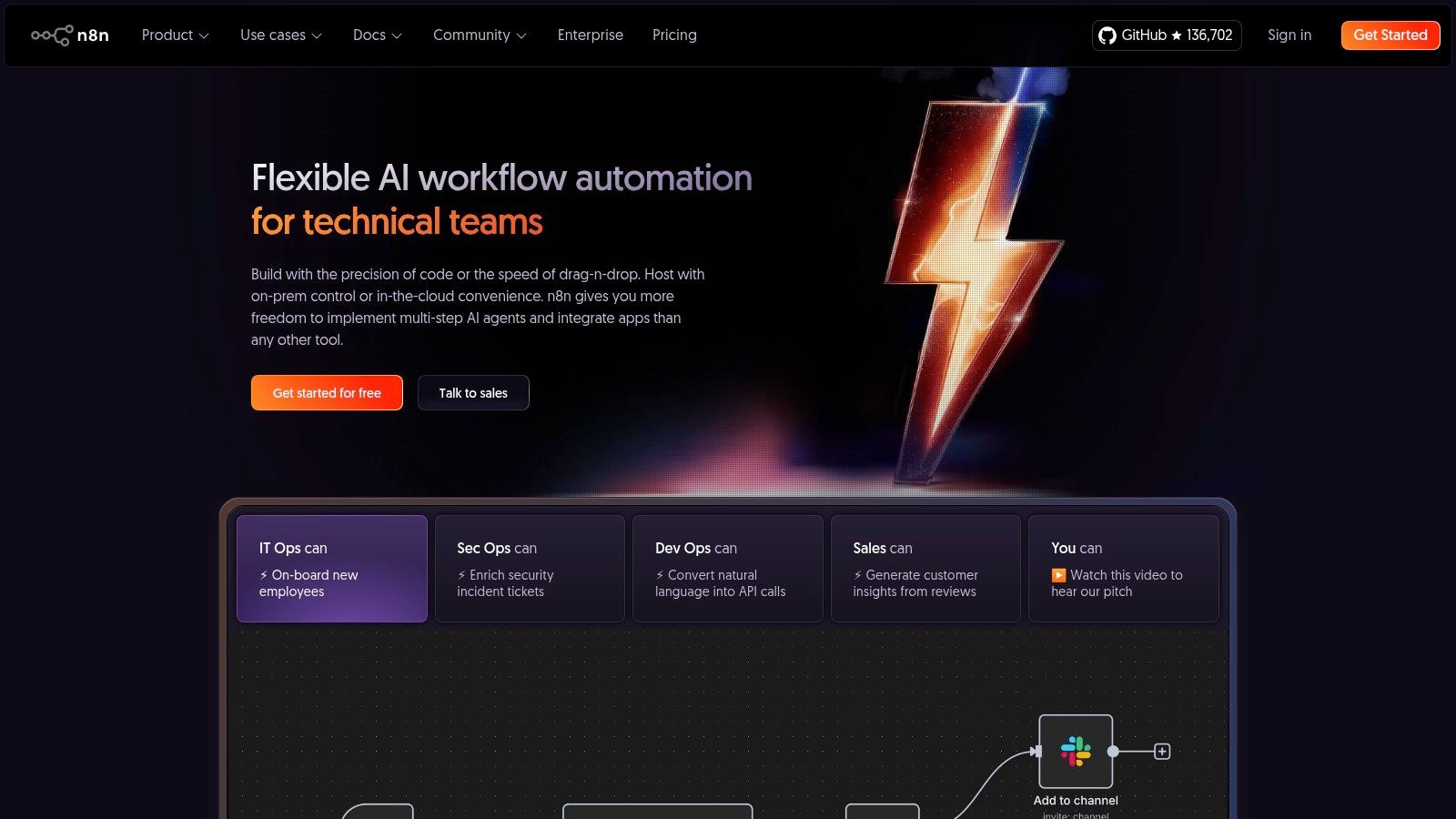
The platform stands out with its node-based builder, which visually represents each step and logic branch in a workflow, offering greater clarity for complex processes. All paid plans include unlimited workflows and users, focusing on execution volume rather than feature-gating. This approach, alongside the ability to execute custom code and build custom integrations, provides unparalleled flexibility for businesses with unique automation needs.
Pros:
Cons:
Website: https://n8n.io
For the millions of small businesses built on Google's ecosystem, the Google Workspace Marketplace is a goldmine of native automation. Instead of connecting external platforms, it offers thousands of integrated add-ons that extend the functionality of apps like Gmail, Sheets, Docs, and Calendar. This approach allows users to automate tasks directly within the Google interface they already use daily, streamlining workflows without disrupting existing processes. It is a key resource for finding highly specific small business automation tools.
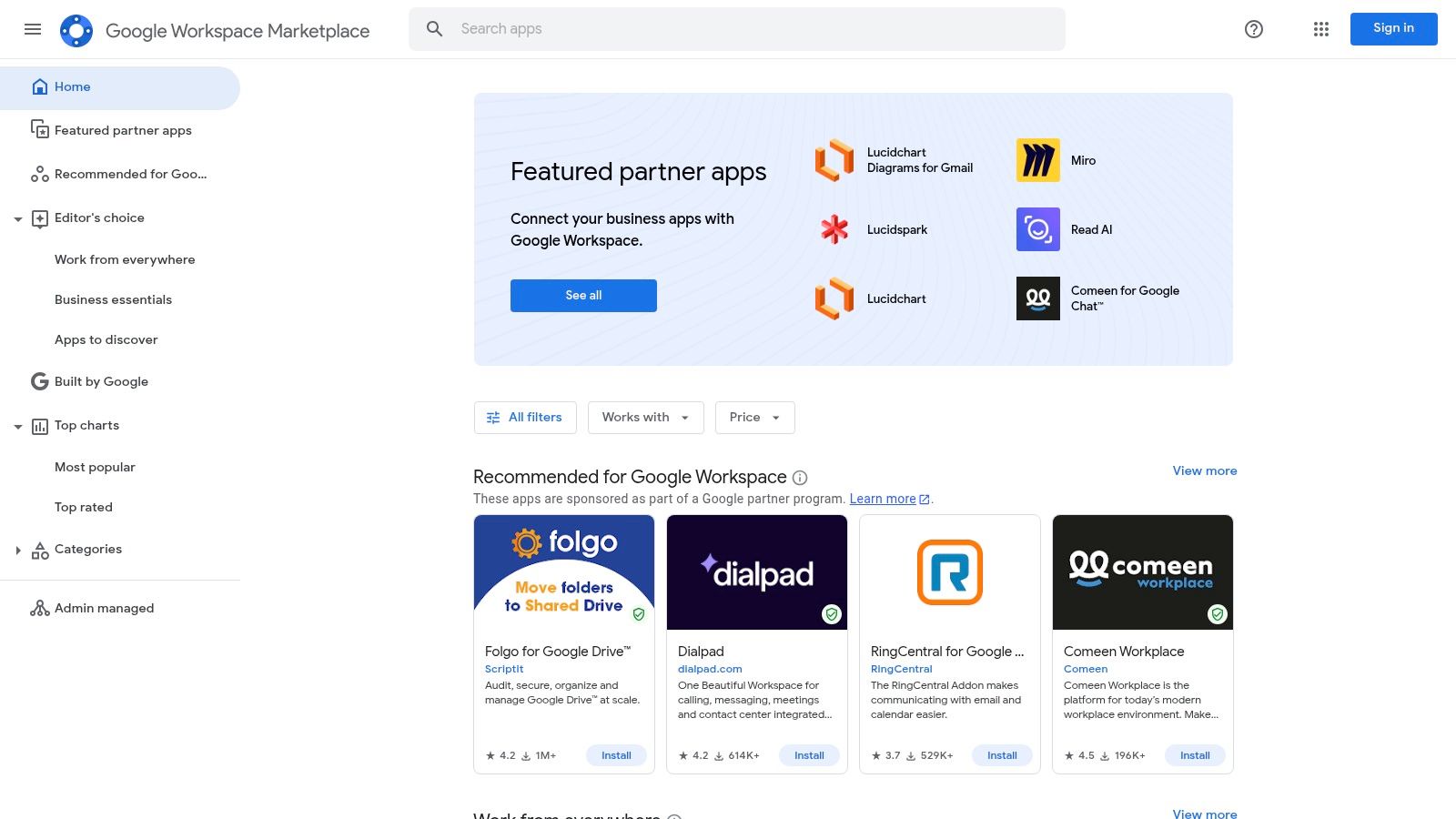
The marketplace's strength is its direct integration, with add-ons for everything from document approvals in Docs to advanced data manipulation in Sheets. Admins can easily deploy tools to their entire domain with one click. Pricing is highly variable, as each third-party vendor sets their own model; some add-ons are free, some are freemium, and others require a separate paid subscription to unlock full functionality.
Pros:
Cons:
Website: https://workspace.google.com/marketplace
For ecommerce businesses built on Shopify, the platform's native App Store is a goldmine of small business automation tools designed specifically for online retail. Rather than a single tool, it’s a marketplace where merchants can find hundreds of apps to automate specific tasks like order tagging, inventory updates, and merchandising. This ecosystem allows store owners to build a custom automation stack tailored precisely to their operational needs, directly within the Shopify environment.
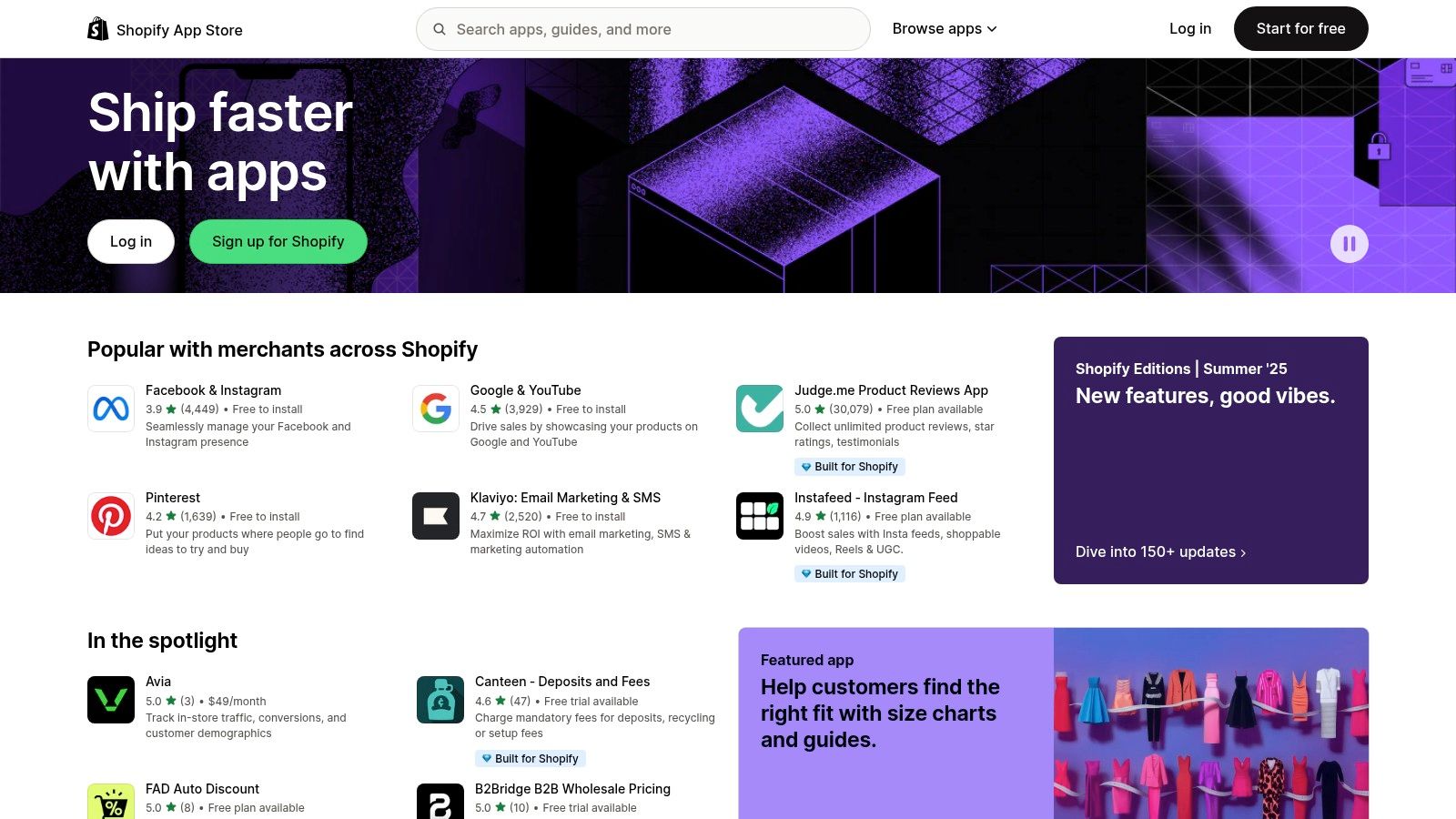
The App Store’s strength lies in its variety and deep integration. You can find apps for automatically sorting products into collections based on tags or sales velocity, scheduling price changes for flash sales, and triggering marketing workflows. Pricing is app-dependent, with many offering free tiers or trials, making it accessible to businesses of all sizes.
Pros:
Cons:
Website: https://apps.shopify.com
AppSumo is a unique marketplace that offers lifetime deals (LTDs) and heavily discounted annual plans on emerging SaaS products. For small businesses seeking to build their automation stack on a tight budget, it serves as an invaluable discovery platform. Instead of selling a single tool, AppSumo curates a rotating selection of software, often featuring innovative small business automation tools in marketing, sales, and productivity before they become mainstream.
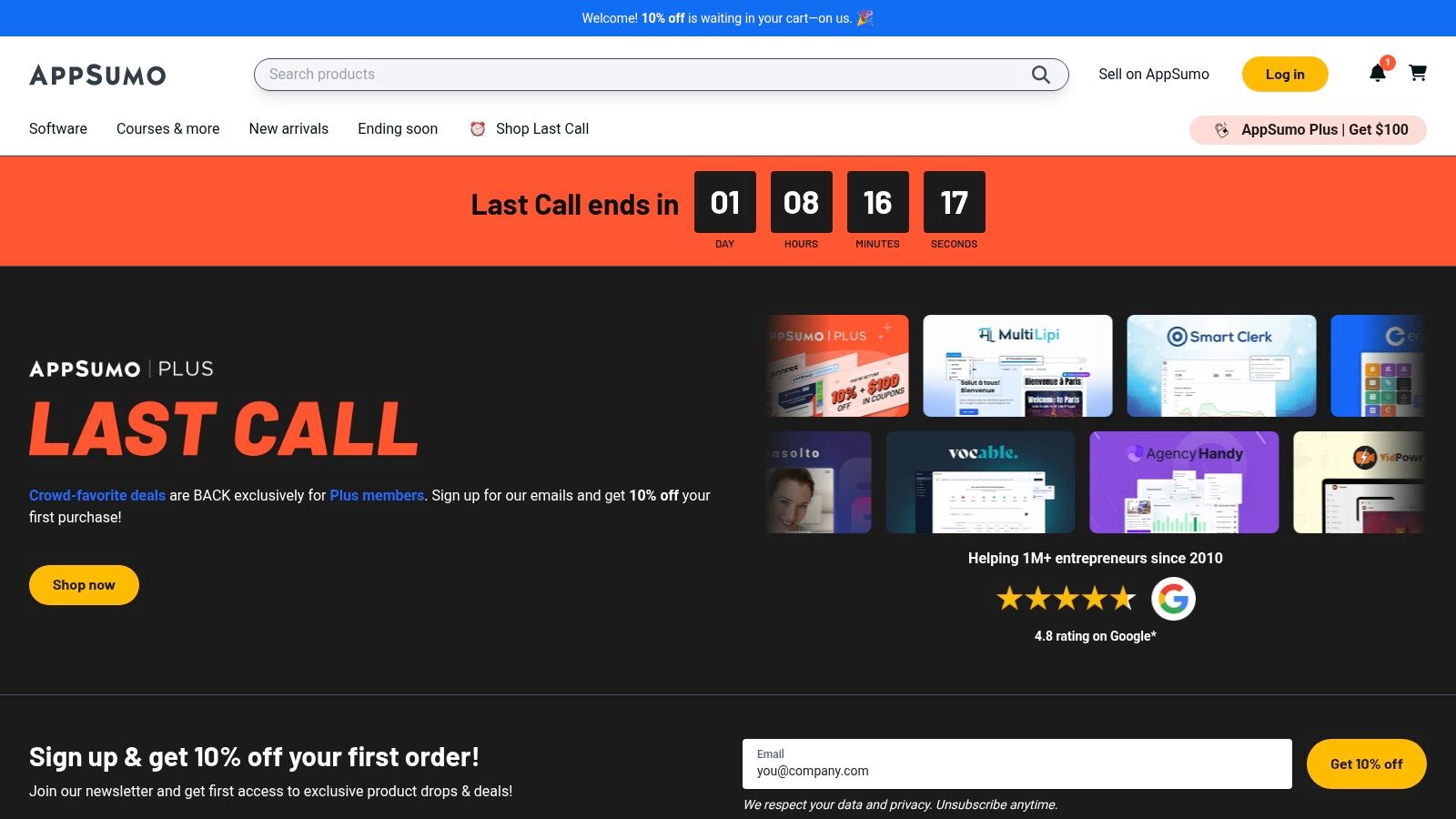
The platform’s core value lies in its deal structure, allowing businesses to acquire powerful software for a one-time fee, drastically cutting recurring subscription costs. Each deal is accompanied by extensive user reviews and a generous refund period, typically 60 days, which lets businesses test if a tool truly fits their workflow. The focus is on finding hidden gems that can automate specific tasks without the enterprise-level price tag.
Pros:
Cons:
Website: https://appsumo.com
We've explored a comprehensive landscape of small business automation tools, from versatile integration platforms like Zapier and Make to specialized solutions like My AI Front Desk for customer service and HubSpot for marketing. The journey from manual processes to an automated workflow can seem daunting, but the potential for growth, efficiency, and improved customer satisfaction is immense. The key isn't to adopt every tool, but to build a strategic "automation stack" that directly addresses your most significant operational bottlenecks.
The central takeaway is this: automation is a strategy, not just a purchase. Each tool, whether it's a no-code connector, a CRM, or an AI-powered receptionist, should serve a clear purpose in your business ecosystem. By offloading repetitive, time-consuming tasks, you and your team are free to focus on high-impact activities like strategy, customer relationships, and innovation.
Before you subscribe to any service, take a step back and map out your path. A thoughtful approach will save you time, money, and frustration down the line. Here’s a final checklist to guide your decision-making process:
Remember to factor in the total cost of ownership, which includes not only the subscription fee but also the time required for setup and maintenance. Furthermore, as you expand into highly specialized areas like recruitment, applying this same strategic lens is vital. For example, when hiring, understanding how to find the best ATS for small business is a crucial step for optimizing talent acquisition and ensuring your tools work together harmoniously. By thinking strategically about each addition, you can build a powerful, interconnected system that serves as the engine for your business's growth.
Ready to automate your front desk and capture every lead, 24/7? My AI Front Desk provides a powerful, affordable solution to manage appointments, answer calls, and engage customers around the clock. Start your free trial today and see how easily you can implement one of the most impactful small business automation tools available at My AI Front Desk.
Start your free trial for My AI Front Desk today, it takes minutes to setup!








